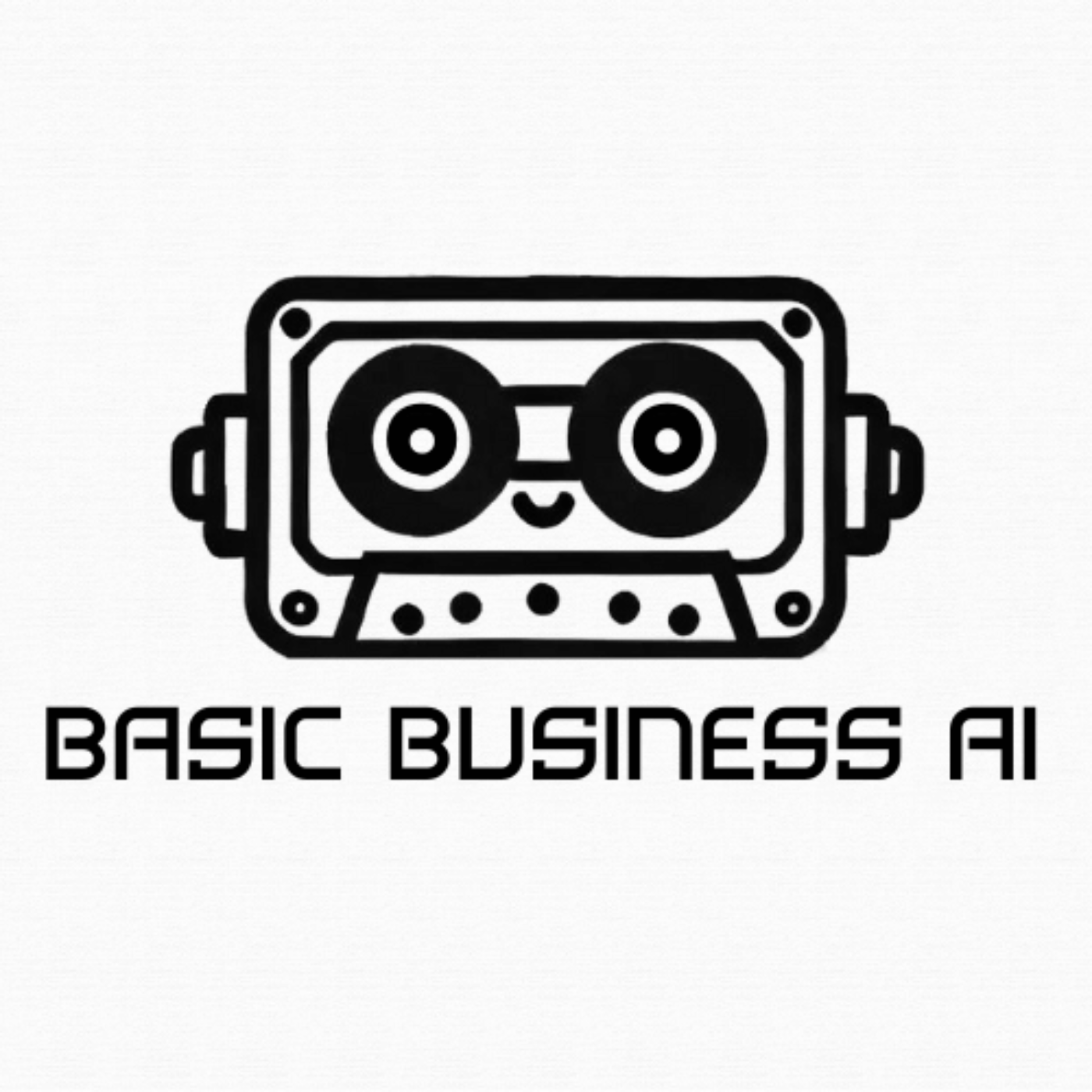Episode Transcript
[00:00:00] Speaker A: Welcome to Basic Business AI, a podcast dedicated to simple AI strategies for businesses who don't want to get an advanced tech degree or hire some marketing bro. I'm your host, Josh Thomas. You can find me on all social media.
We bring on regular business owners just like you and me to discuss practical strategies, ideas, and perspectives about AI without getting too far into the weeds of the tech. BBAI is sponsored by Anabots. Did you know companies that respond to customer inquiries in less than 1 minute have a 400% higher chance of closing the deal. Our AI powered assistants have an average response time at just 9 seconds, meaning you can close more sales without generating more leads. No tech skills are needed, and you can get started in less than ten minutes. You can go to Anabots AI to learn more. Once more, that's Anabots AI. Today's guest is Saraya Bronson. And Sarai Bronson provides back office and administrative smart to small businesses in three areas. Marketing, website design, social media. Also logo, branding, graphics design, finance, bookkeeping, payroll and operations, HR support, admin support, software implementation. Soraya, welcome to basic business. Aihdem. From your perspective, how is AI reshaping the future of your industry?
[00:01:24] Speaker B: Thank you, Josh, for the introduction. I would say that AI is really changing our industry by making us so much faster.
What used to take me days or weeks to build and flush out and complete, we can now do in a matter of hours.
It's been incredible to, for instance, take our hr. You know, in our human resources, we are building employee handbooks so that business owners can really communicate with their employees their expectations. And usually the process of building an employee handbook would take us a couple of weeks, just, you know, fleshing out, rewording, making sure it fits the client. And with AI, we can do it in a day.
[00:02:08] Speaker A: Wow. Tell me a little bit more about that. And this is something that a lot of us would really love to do. We have the boring administrative stuff, and we got to build our sops and employee handbooks.
But with proper AI and a little bit of guidance, you can reduce the amount of time it takes to do almost anything by, like 90%. So tell me a little bit more about what you just described. Can you go into more detail?
[00:02:39] Speaker B: Yeah. So I love that you brought up sops because that's one of everybody's favorites, that they're like, oh, no, don't make me do that. Please don't.
Getting into your AI software, and it's really just fleshing out those questions. As long as you're giving it the questions to outline your SoP exactly what you're looking for. It's going to pull in so much information. And I love there's a lot of times business owners will get in their own head and they get really stuck on, whoa, I don't know. And I like, do they really need to do this or should they be doing this? And it just helps give a more clear outline faster. It opens up so many thoughts that you didn't think of yourself and it's never 100% perfect, but it gives you a quick outline that your brand can then take and be like, oh, that is exactly what I needed. I didn't even think about making sure they knew that or remembered that or whatever it is in the process that you're trying to build. So the biggest thing is if you can know some good questions, as long as you've got good questions, it's going to fill in the blanks.
[00:03:47] Speaker A: Makes a lot of sense. And so tell me, what are some of the top applications that you have seen for AI? Aside from helping build some of this documentation for sops and that sort of things, what are some other things that you've seen? Dive into that a little bit more.
[00:04:05] Speaker B: So some other things, like when I'm struggling with how to word things or if you're just unsure of a topic, like when I'm trying to learn something new and I'm struggling with like, exactly what I like. Sometimes you don't know what you don't know, right. And you want to learn more about the subject you don't know. Just having a conversation with the AI and like, hey, this is what I'm learning. What are things that are really important that I should make sure I learn while learning, like bookkeeping or administration of a doctor's office. Like, I want to be able to do this. Like, what should I be looking for? Where am I missing? Because sometimes in us learning and educating ourselves, we take the course, but we only gather what we can because we don't really know where we're lacking. And so just actually starting the conversation because the AI can pull from so much out there, there's so much information at our fingertips, it's hard to digest it all and just having that conversation with it and being like, okay, what should I be focusing on? What are the questions I should be asking? Or what would you know? And it's not like I said, you can't always, it's not like it's 100% foolproof, but it'll get you going in a better direction than you were before.
[00:05:23] Speaker A: So talk to your robots.
[00:05:26] Speaker B: Yes. Talk to your robots. I find myself, it's so funny. I'll say, please, can you translate this instead of just saying, translate it? I'm like, even in. I'm so. My mom ingrained it so much in me. Please and thank you. It's so hard, like, when it something to not say, oh, thank you.
[00:05:42] Speaker A: Well, there's a justification for that that I've heard that I tend to agree with. So basically, you should be polite to the AI now, for whenever it subjugates us, it'll remember.
[00:05:55] Speaker B: Oh, there you go. I like that. You'd be like, I was nice to you. You like me?
[00:06:00] Speaker A: Yeah. I'm one of the good humans. Remember favorably upon me.
[00:06:07] Speaker B: I love that. That's so funny.
[00:06:09] Speaker A: Yeah. So.
And specifically about.
You have several different areas of focus.
Where have you seen AI be the most impactful? So, for instance, if I'm looking at the different areas that you focus on, you've got marketing, you've got finance, you've got operations. Which one of these have you seen the most immediate practical applications of AI?
[00:06:37] Speaker B: I would say the operations side.
Building the system and processes for businesses is so arduous and so technical and so long scoped and especially HR systems and processes. And how, how do I hire someone? How do I fire them? How do I make sure I did it right and just really fleshing all of those out? It can be a really boring process, and this makes it faster and more fluid. And it actually, like, I mean, I love it. So I'm not quite so bored, but I know that some people struggle with it a lot, and so it just makes it easier when you're going through those processes and you're like, I have a business and I need to make a system so I can hire someone. You can say, hey, this is what I do. I just did, blah, blah, blah, blah, blah, blah, because, well, I know what I do, and I did it really well. And if you tell it all that, then I'd be like, it can help you make a process, an SOP. It can actually take what you said, hey, this is what I did. Break it down for me so I could teach someone else. It'll take that information and give you something that someone else could actually understand. Whereas as a human, I'd be like, oh, I explained that really good to my employee. They're good to go, and then they come back to me and I'm like, that's not what I said.
That's not what I gave you.
[00:07:56] Speaker A: Just chat GPT, what I told you that's one of the things that I've noticed, and it sounds like you use chat CPT quite a bit, is sometimes you give it very clear instructions, do these things, and then it comes, it comes back and it's like, how about this purple unicorn, you know? And I'm like, that's not what I wanted at all. So how did you, how did you take what I said and turn it into that?
[00:08:23] Speaker B: Yes.
[00:08:24] Speaker A: So it goes both ways?
[00:08:26] Speaker B: Yes.
Interesting. When it, when it comes to you with that, I always go back to look what I said and I can usually find where I messed up on the information that I gave it or you gave it too much. Like, you can overload it and give it too much. It's best, I have found that it's best to build in a sequence of questions, to give it a little information and then say, now ask me a few clarifying questions or ask me five things that you need to know more of before we build this email or this contract or this whatever.
[00:08:59] Speaker A: And that's an important point, and I'm glad that you brought that up because I've had some conversations with people who have questions about, aih, like, hey, you know, we're building this AI company.
We help businesses integrate AI and practical solutions without getting too techy. And usually for somebody who knows absolutely nothing about AI, usually the conversation goes something like this.
Oh, great. So can you get it to like do a full background check on the person and then write, like, can I upload like 14 novels and have it pick like page 300 of each of those novels and then recite it back to them, but in French, and it's like, no, dude, no, you're missing the point. That's not how this works. It's designed to simplify things. It's not designed to go and collect all this information and think for you. You still got to think. Humans still got to think. Have you, have you run into some of that? And the only reason I ask is it surprises me. It's like the less somebody knows about technology, the more like space age Star Trek they get with like, can you build me something that does this? No, I can't.
[00:10:18] Speaker B: Like Iron Man's thing that's like, oh, here, let me do that for you. Here, let me fix, oh, here's the calculations that you need.
[00:10:26] Speaker A: Yes.
[00:10:27] Speaker B: And everything.
[00:10:29] Speaker A: Yeah, exactly.
[00:10:30] Speaker B: I have run into people that are just like, oh, they don't want to touch it. They think it's kind of creepy.
I don't think I've seen so much of the purple unicorns, where they think, oh, it'll just magically make me things. A lot of people's biggest struggle, though, is they just don't even know how to ask it questions. They're like, they just look, they're like, what do I put into it? What do I say?
[00:10:57] Speaker A: What do I, let's start there. How do we ask? AI chat GPT is an easy entry for almost everybody. My grandma knows what chat GPT is, but it really doesn't matter if it's chat GPT, or cast magic or Claude or any other program that is built with a that language model. Let's talk about how to ask the proper questions. What are some ways that you use to actually ask the AI the right questions so you can get the responses you need?
[00:11:30] Speaker B: So the one, the three things that I always make sure that I do is one, I identify the area I'm working in and so I don't want to use a chat that I've used for something else if I need to start fresh, and I don't want to build off of it. So I, you know, and I was trying to, you know, I tell the AI write off, hey, this is the project I'm doing. This is what it's for, and this is why I'm doing it. So I've given it parameters to say, you know, I'm an HR manager, I'm building a hiring process, and I have to build email templates. Right now. The first email template I would like to build has to do with reaching out to a candidate, telling them I want the references, and then I can ask from there. But if you don't give it an outline or a basis to go off of, then you get your purple unicorns and you're like, okay, that was fun. And one of the good clarifying thing to give the information is how you want to sound. Like, do you want to be professional? Do you want to be motivational? Do you want to be fun and energetic and not serious? You know, how are you wanting whatever it is that you want to come back at you? Because if you don't give it some kind of parameter to sound like, then, I mean, you can get all, you know, like you said, all those fun ones.
[00:12:54] Speaker A: You know, it's funny. We do a demo on writing one piece of content. We call it talk GPT, where you can do it without ever writing a single word or without ever typing a single word. And part of the training is we, we talk out a topic and we have Chachi bt clean it up into a 250 word article.
And then we ask it to rewrite the article in the tone and style of.
And then we have somebody give a recommendation. So we've gotten Robin Williams, we've gotten Lord of the Rings.
We got Justin Timberlake one time, and one time we got Jurassic park, which gave us a pretty good result, but. And so we, we suggested, well, something like Jurassic park. And then the guy said, how about the Jurassic park dinosaur? And we were like, let's see what happens. And so, and so we rewrote this article in the tone and style of the Jurassic park dinosaur.
And sure enough, man, it was like, grr.
It was like, it would, like, stop in the middle of the sentence to roar.
It was the best, man.
[00:14:14] Speaker B: I think if I could play with it all day, I mean, you could make some of the funniest things that probably would go, like, viral.
[00:14:20] Speaker A: And so she'll be like, look what I. Yeah, exactly.
[00:14:24] Speaker B: Yeah.
[00:14:24] Speaker A: I think I might make a channel where I just read some of these random voices. Yeah. So. Well, hey, so, rya, tell us a little bit more about what do you do, who do you serve and how can they connect with you?
[00:14:35] Speaker B: Awesome. I would love to. So I am the business efficiency expert, and I am an expert at coming into a business and just helping it become more efficient, systematizing, processing, really smoothing out those things that as a business owner, you're juggling a lot of things. A lot of them fall through the cracks, and we just help lift those cracks up and stop dropping some of those balls. So where you can find me is I'm on Facebook, Instagram, and LinkedIn at silverprosolutions, and my website is also silverprosolutions.com. so that's where people can connect with me and learn more.
[00:15:14] Speaker A: Excellent. Thanks so much for being here. We're going to wrap up this episode of Basic Business AI. Appreciate Sariah Bronson for sharing how she uses AI to create more business efficiency. And for those of you who want to connect with her and learn more, you can go to silverprosolutions.com. is that right?
[00:15:36] Speaker B: Yes.
[00:15:37] Speaker A: Excellent. If you do run a business of any kind and size and you have some ideas or strategies or even questions around the topic of AI, we'd love to have you on a future episode as well. We interview business owners of all levels of experience and exposure to AI so that we can represent all voices, especially the 90% of us who really are curious about it. But we're not trying to be tech geniuses. You can apply for a future episode by going to basicbusinessai.com. and one more time, if you want to install a sales and support team for less than 10% of the cost of a single employee, get yourself an anabot. Learn more at anabots AI. We'll see you next time on basic business AI. And by the way, if you liked this episode, tell your friends. See you later.



